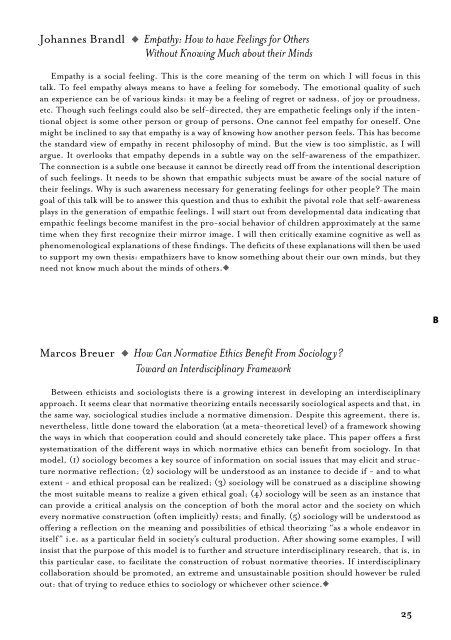Verlag.Buchhandel.Service. - Österreichische Gesellschaft für ...
Verlag.Buchhandel.Service. - Österreichische Gesellschaft für ...
Verlag.Buchhandel.Service. - Österreichische Gesellschaft für ...
Sie wollen auch ein ePaper? Erhöhen Sie die Reichweite Ihrer Titel.
YUMPU macht aus Druck-PDFs automatisch weboptimierte ePaper, die Google liebt.
Johannes Brandl ◆ Empathy: How to have Feelings for Others<br />
Without Knowing Much about their Minds<br />
Empathy is a social feeling. This is the core meaning of the term on which I will focus in this<br />
talk. To feel empathy always means to have a feeling for somebody. The emotional quality of such<br />
an experience can be of various kinds: it may be a feeling of regret or sadness, of joy or proudness,<br />
etc. Though such feelings could also be self-directed, they are empathetic feelings only if the intentional<br />
object is some other person or group of persons. One cannot feel empathy for oneself. One<br />
might be inclined to say that empathy is a way of knowing how another person feels. This has become<br />
the standard view of empathy in recent philosophy of mind. But the view is too simplistic, as I will<br />
argue. It overlooks that empathy depends in a subtle way on the self-awareness of the empathizer.<br />
The connection is a subtle one because it cannot be directly read off from the intentional description<br />
of such feelings. It needs to be shown that empathic subjects must be aware of the social nature of<br />
their feelings. Why is such awareness necessary for generating feelings for other people? The main<br />
goal of this talk will be to answer this question and thus to exhibit the pivotal role that self-awareness<br />
plays in the generation of empathic feelings. I will start out from developmental data indicating that<br />
empathic feelings become manifest in the pro-social behavior of children approximately at the same<br />
time when they first recognize their mirror image. I will then critically examine cognitive as well as<br />
phenomenological explanations of these findings. The deficits of these explanations will then be used<br />
to support my own thesis: empathizers have to know something about their our own minds, but they<br />
need not know much about the minds of others.◆<br />
Marcos Breuer ◆ How Can Normative Ethics Benefit From Sociolog y?<br />
Toward an Interdisciplinary Framework<br />
Between ethicists and sociologists there is a growing interest in developing an interdisciplinary<br />
approach. It seems clear that normative theorizing entails necessarily sociological aspects and that, in<br />
the same way, sociological studies include a normative dimension. Despite this agreement, there is,<br />
nevertheless, little done toward the elaboration (at a meta-theoretical level) of a framework showing<br />
the ways in which that cooperation could and should concretely take place. This paper offers a first<br />
systematization of the different ways in which normative ethics can benefit from sociology. In that<br />
model, (1) sociology becomes a key source of information on social issues that may elicit and structure<br />
normative reflection; (2) sociology will be understood as an instance to decide if - and to what<br />
extent - and ethical proposal can be realized; (3) sociology will be construed as a discipline showing<br />
the most suitable means to realize a given ethical goal; (4) sociology will be seen as an instance that<br />
can provide a critical analysis on the conception of both the moral actor and the society on which<br />
every normative construction (often implicitly) rests; and finally, (5) sociology will be understood as<br />
offering a reflection on the meaning and possibilities of ethical theorizing “as a whole endeavor in<br />
itself” i.e. as a particular field in society’s cultural production. After showing some examples, I will<br />
insist that the purpose of this model is to further and structure interdisciplinary research, that is, in<br />
this particular case, to facilitate the construction of robust normative theories. If interdisciplinary<br />
collaboration should be promoted, an extreme and unsustainable position should however be ruled<br />
out: that of trying to reduce ethics to sociology or whichever other science.◆<br />
25<br />
B


